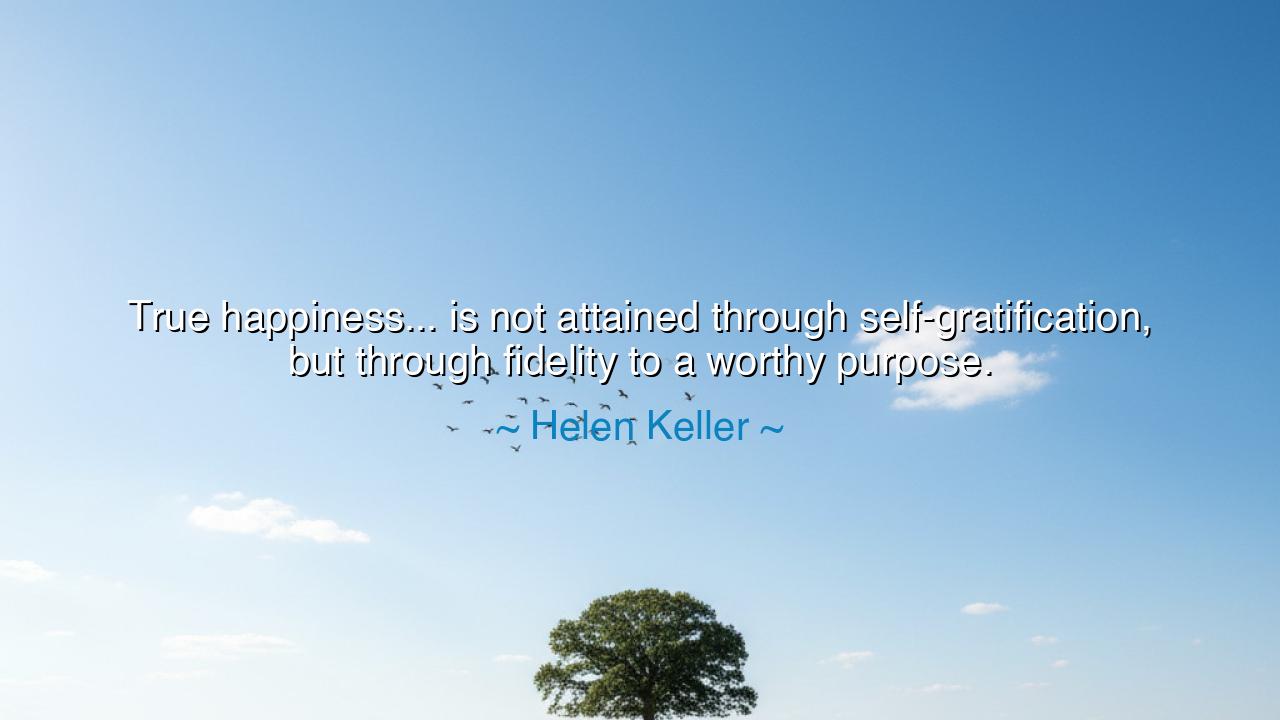
True happiness... is not attained through self-gratification, but
True happiness... is not attained through self-gratification, but through fidelity to a worthy purpose.






Hear now, child of the living world, the wisdom of ages that flows through the words of Helen Keller, who, though shrouded in darkness and silence, spoke truths that shine like stars in the night: “True happiness... is not attained through self-gratification, but through fidelity to a worthy purpose.” In these words dwells a sacred law of the human soul—a teaching as old as fire and as enduring as love. For it tells us that joy is not the fleeting pleasure of the senses, but the lasting peace of the spirit aligned with meaning.
Helen Keller knew suffering more intimately than most who walk upon the earth. She was both blind and deaf, yet her world was not empty—it was filled with the luminous echo of purpose. Through her guide, Anne Sullivan, she learned not merely words, but the heartbeat of life itself. The darkness that could have been her tomb became her temple, where she discovered the divine truth that life’s sweetness is not found in comfort, but in devotion to something greater than oneself. Her fidelity to a worthy purpose—the education and upliftment of others—transformed her pain into a legacy that still burns bright across centuries.
The ancients, too, spoke of this same law. The philosophers of old Athens declared that the good life is not a banquet of pleasures but a harmony of virtue. Aristotle taught that happiness—eudaimonia, the flourishing of the soul—comes not from indulgence but from fulfilling one’s purpose with excellence. The stoics, too, whispered the same truth: that man must live not for the momentary delights of the body, but for the steadfast pursuit of moral greatness. Helen Keller’s words are the modern echo of this ancient wisdom, reborn through the lips of one who lived its essence.
Consider the story of Florence Nightingale, the lady of the lamp, who walked among the dying soldiers of the Crimean War. Wealth, comfort, and admiration were hers to claim—but her heart yearned for service. Amidst the cries of the wounded and the stench of suffering, she found something the idle rich could never taste: true happiness. Her lamp, glimmering in the darkness, became a symbol of humanity’s highest calling—the light of compassion guided by purpose. She did not seek pleasure, but she found joy; she did not chase happiness, but happiness followed her faithful heart.
So too must we, who live in an age of noise and indulgence, remember that self-gratification is a mirage. It promises fullness but delivers emptiness. The feast of pleasure leaves the soul hungry, for its delight fades like dew at dawn. But fidelity to a worthy purpose—to family, to justice, to truth, to creation—roots us in something eternal. It transforms our labor into worship, our struggles into triumphs, and our days into a sacred offering.
To live with fidelity is to endure storms without surrender. It is to hold fast when the path grows dim, to keep faith when the world mocks your vision. For purpose is not always easy, nor is it gentle. It demands sacrifice, patience, and courage. Yet those who serve it faithfully find within themselves a power that outlasts fear—a joy that neither time nor failure can destroy. Such joy is not loud or fleeting; it is quiet, like the peace of dawn after a long night.
Therefore, O listener, let this be your charge: seek not the soft comforts of self-gratification, but the noble fire of purpose. Ask yourself each morning, “What cause is worthy of my soul today?” Pour your energy into that cause, be it love, art, service, or learning. And when you falter, remember Helen Keller, who, though deprived of sight and sound, saw farther and heard deeper than most. Her life is a living testament that even in darkness, one can shine with meaning.
For in the end, the measure of our lives will not be how much we have tasted, but how deeply we have served. And when we walk at last into the stillness beyond, may our hearts whisper, “I was faithful to my purpose.” Then shall we know the true happiness that Helen Keller spoke of—the happiness that is not given by the world, but born of the soul’s unwavering devotion to what is good, noble, and eternal.






AAdministratorAdministrator
Welcome, honored guests. Please leave a comment, we will respond soon